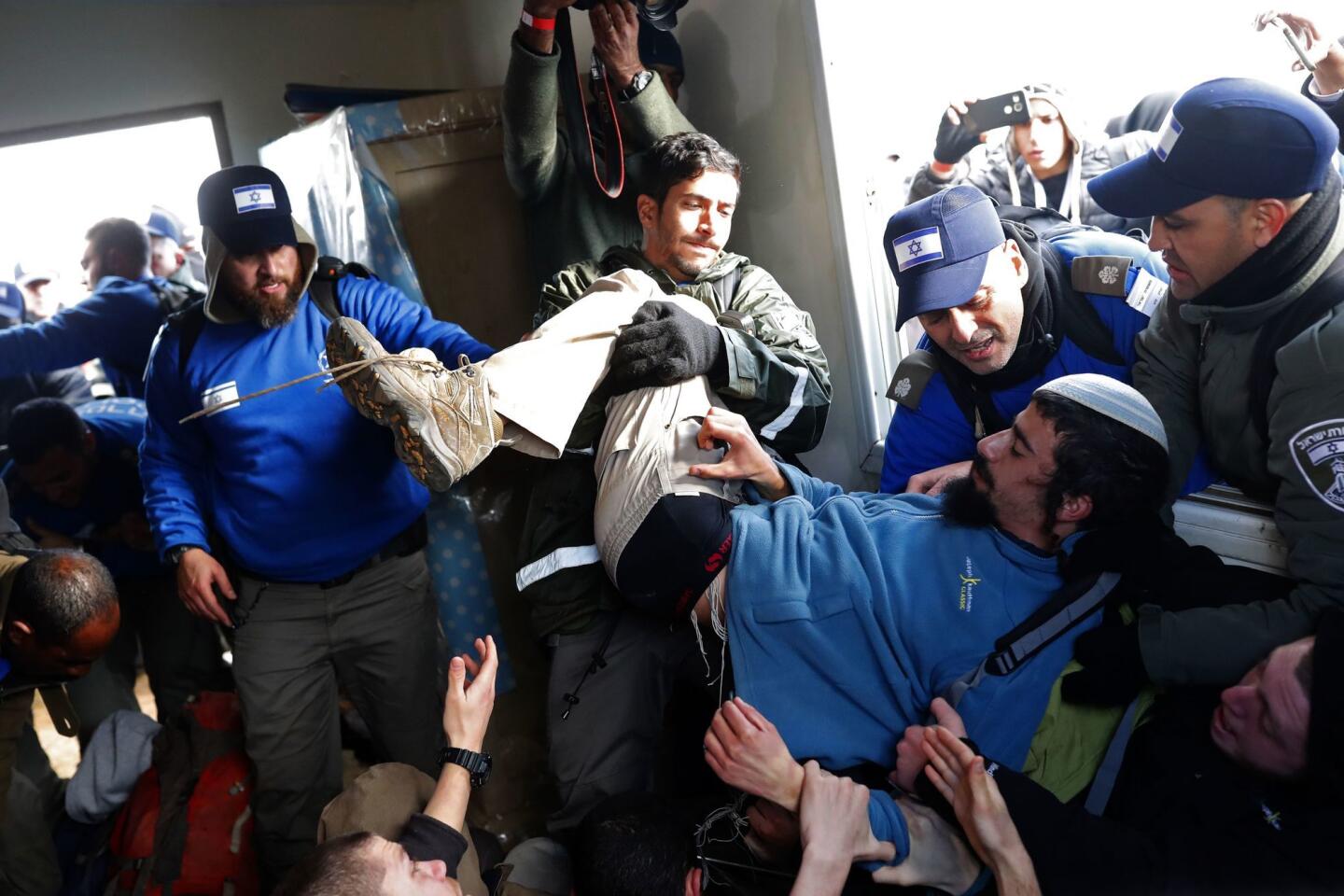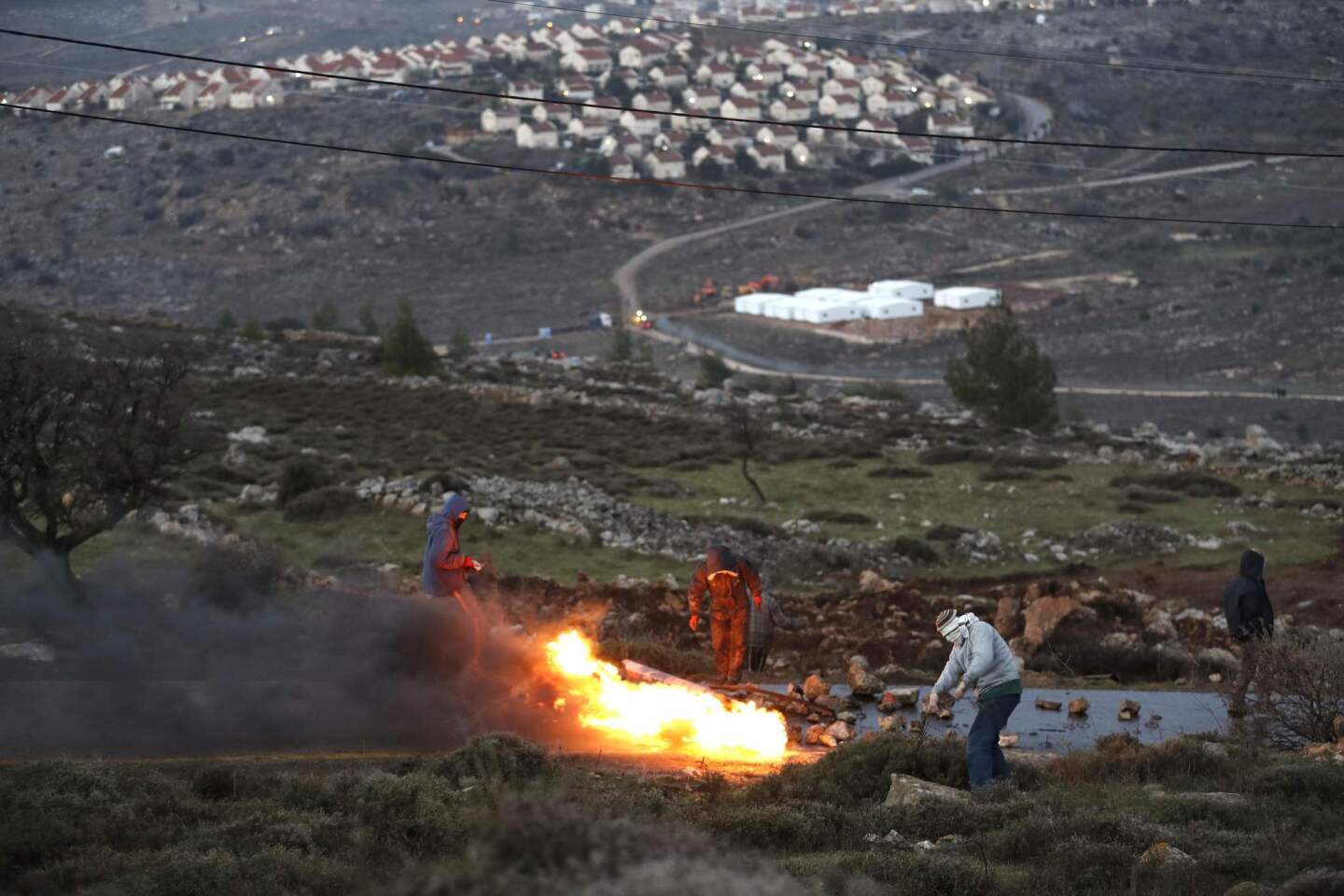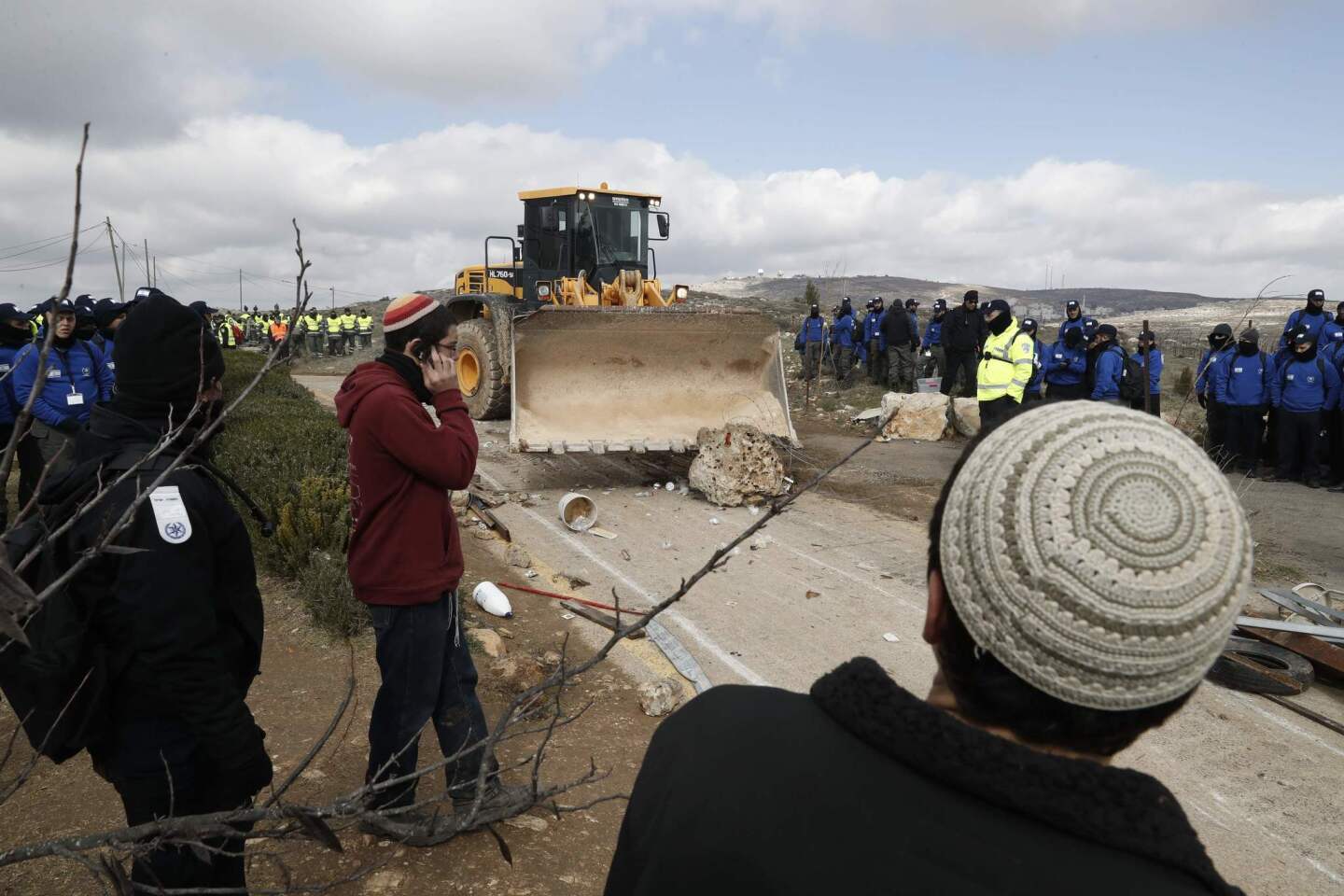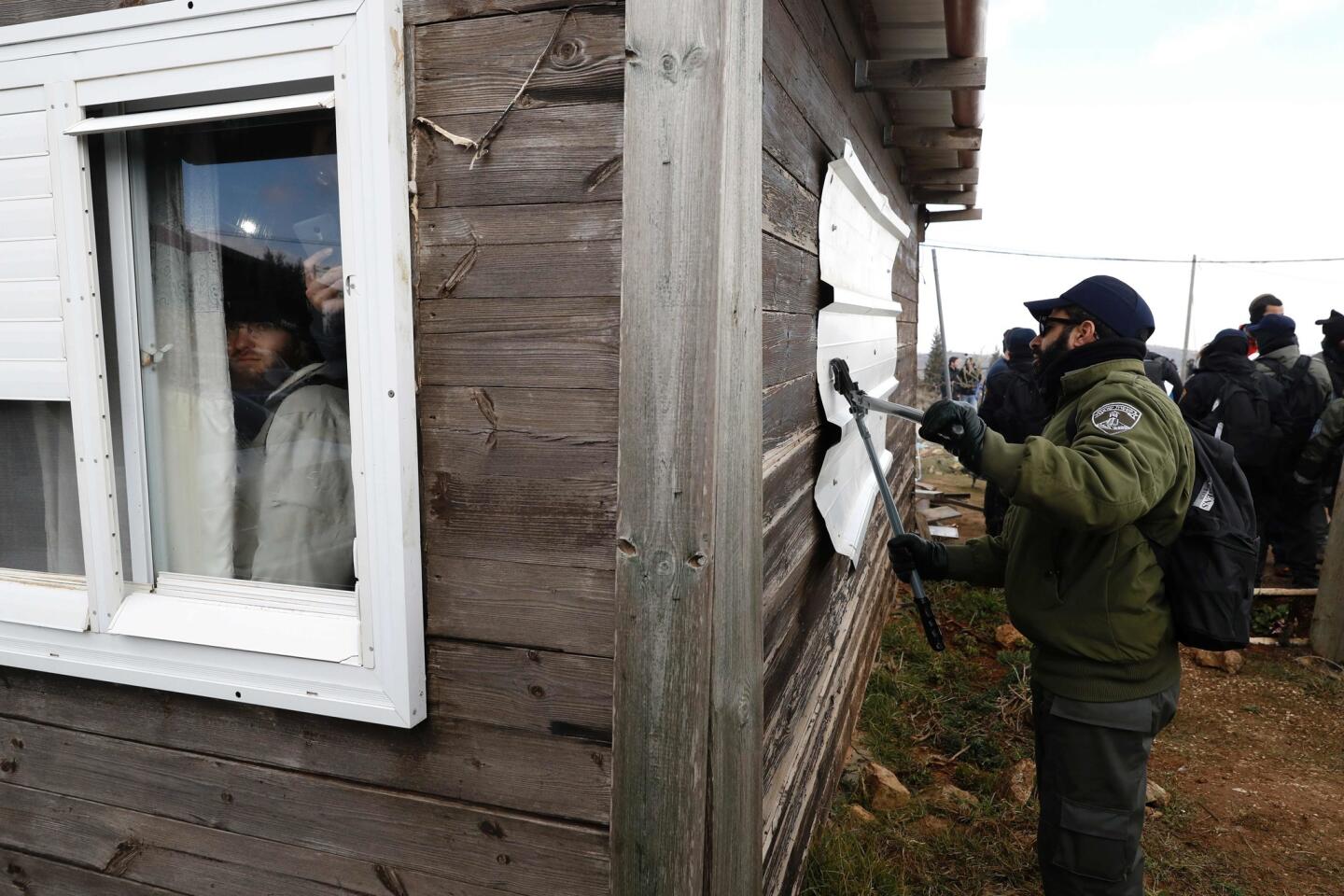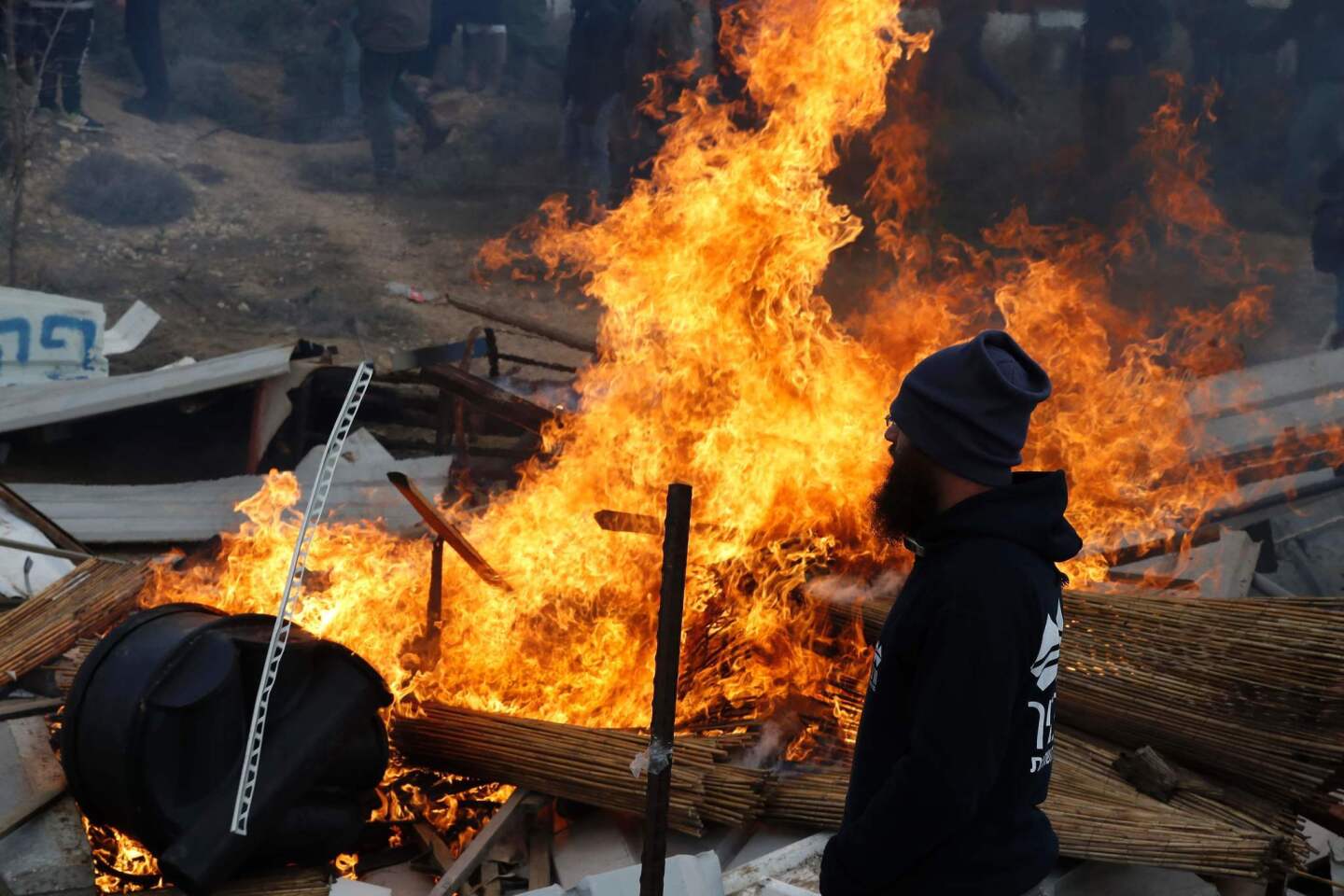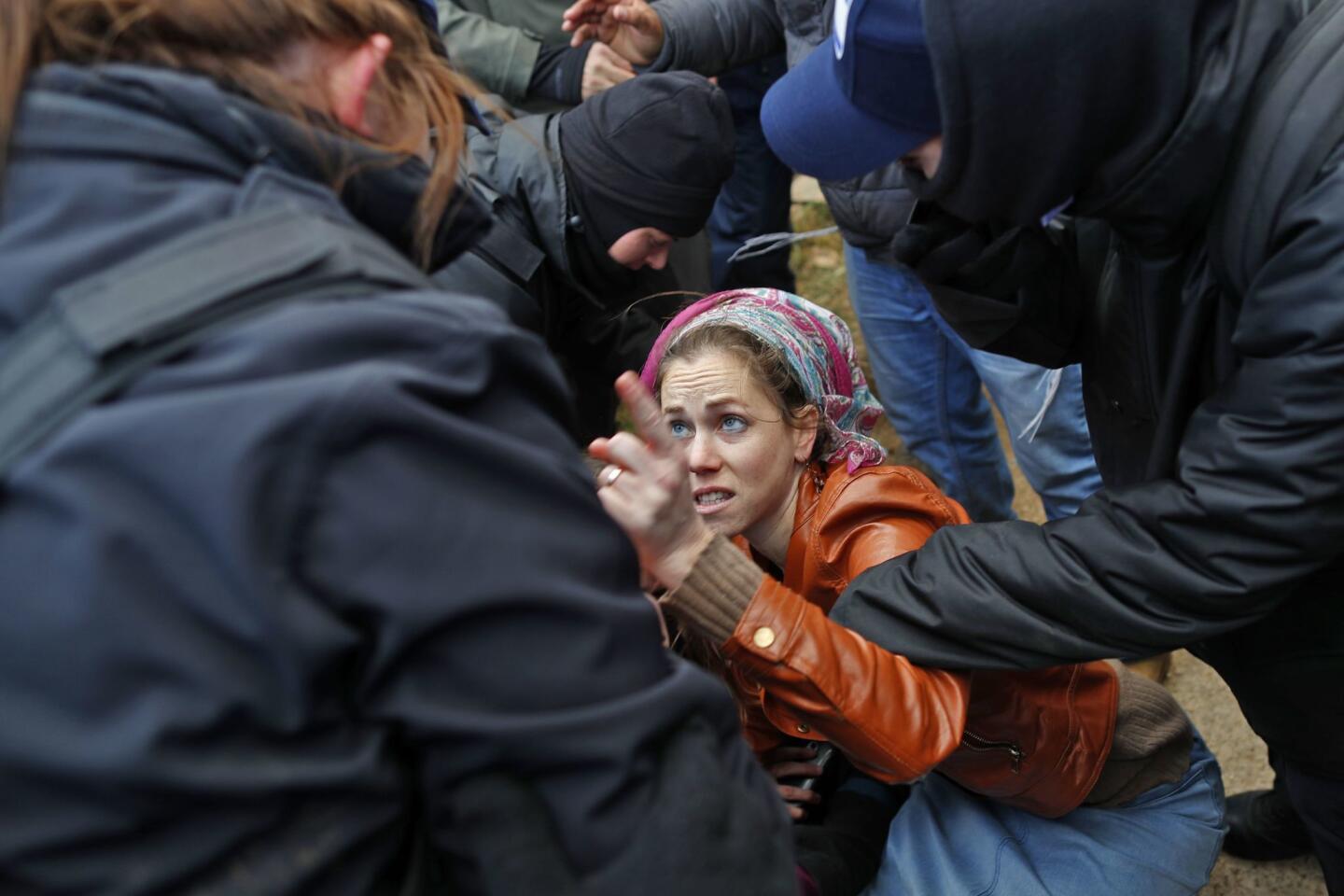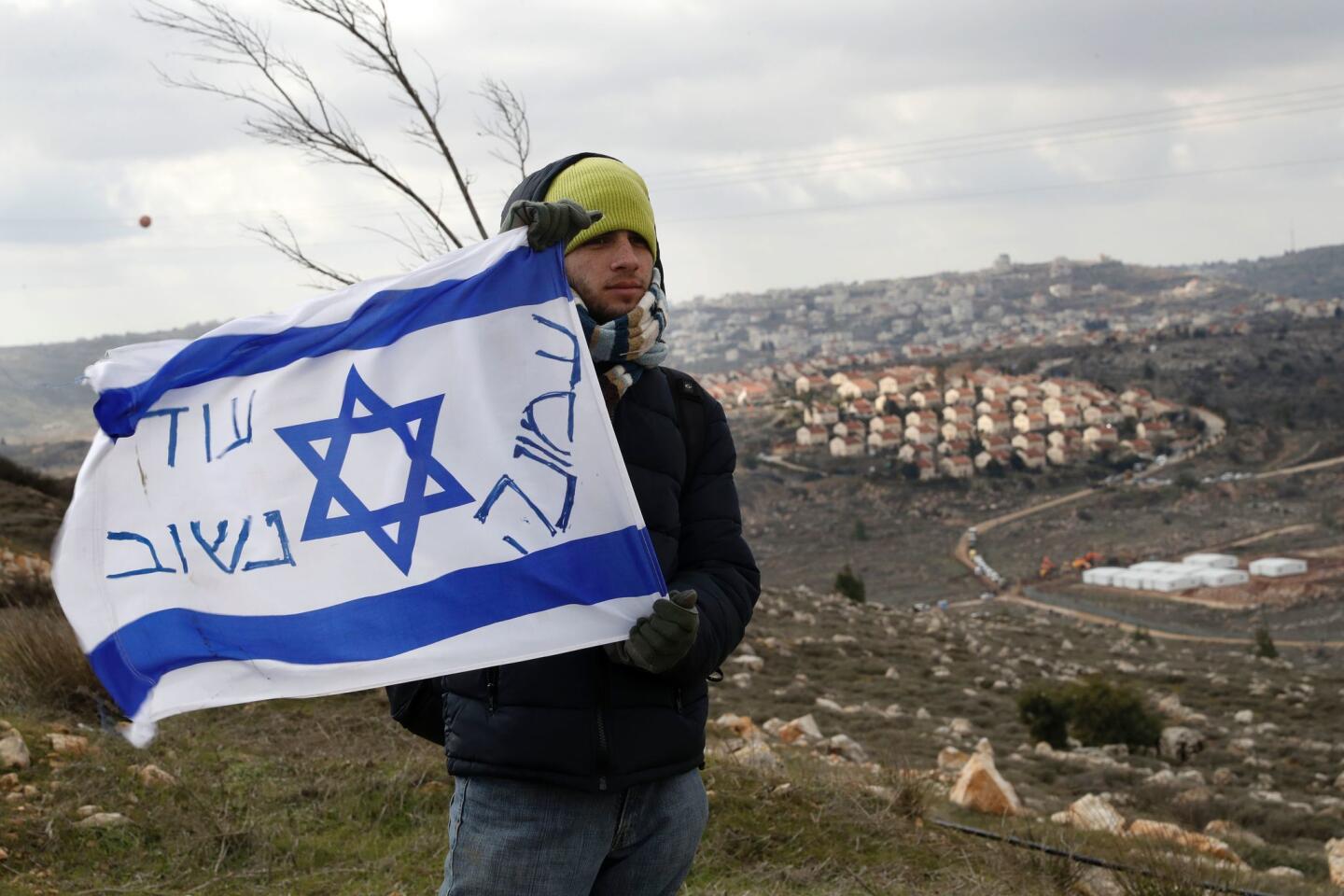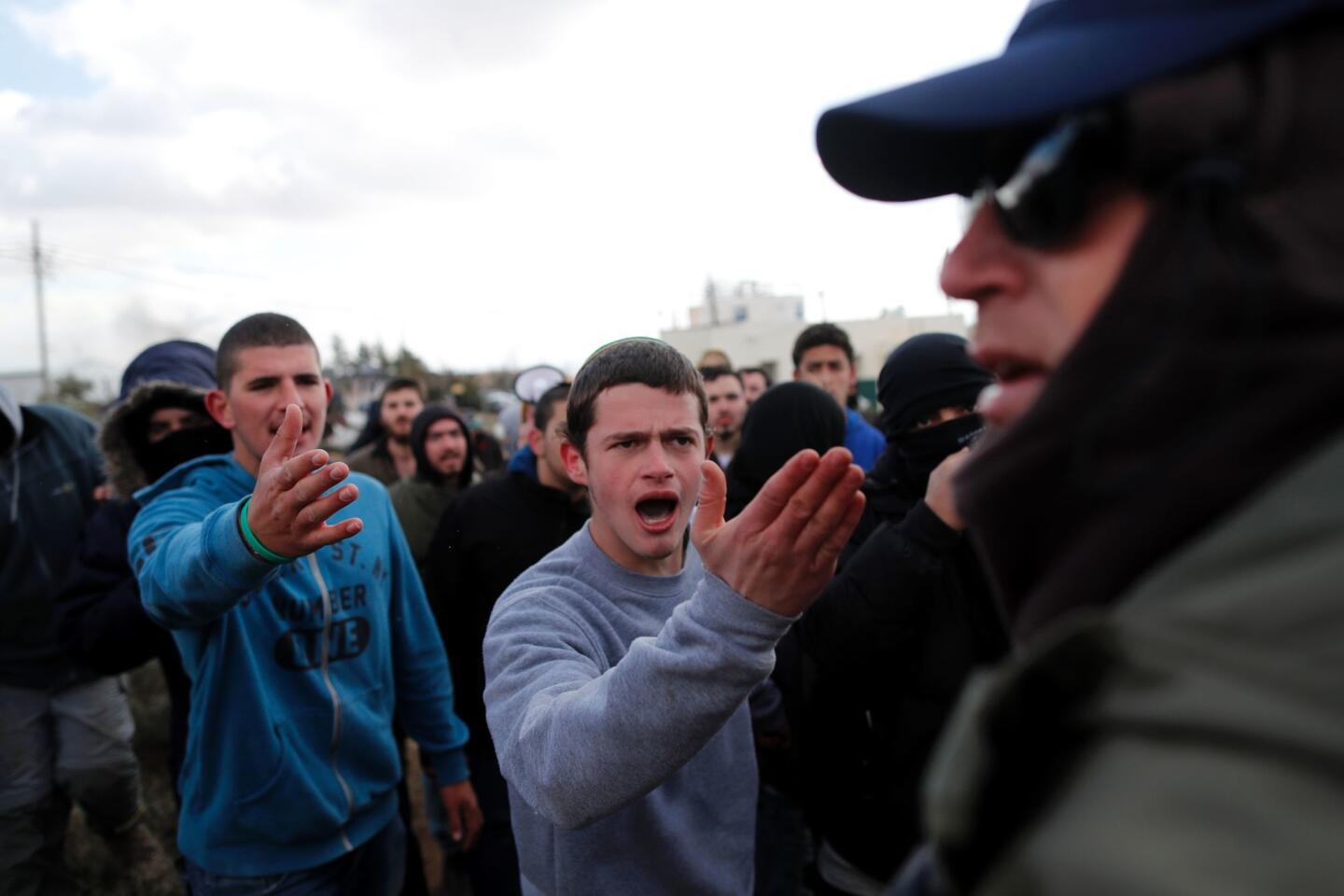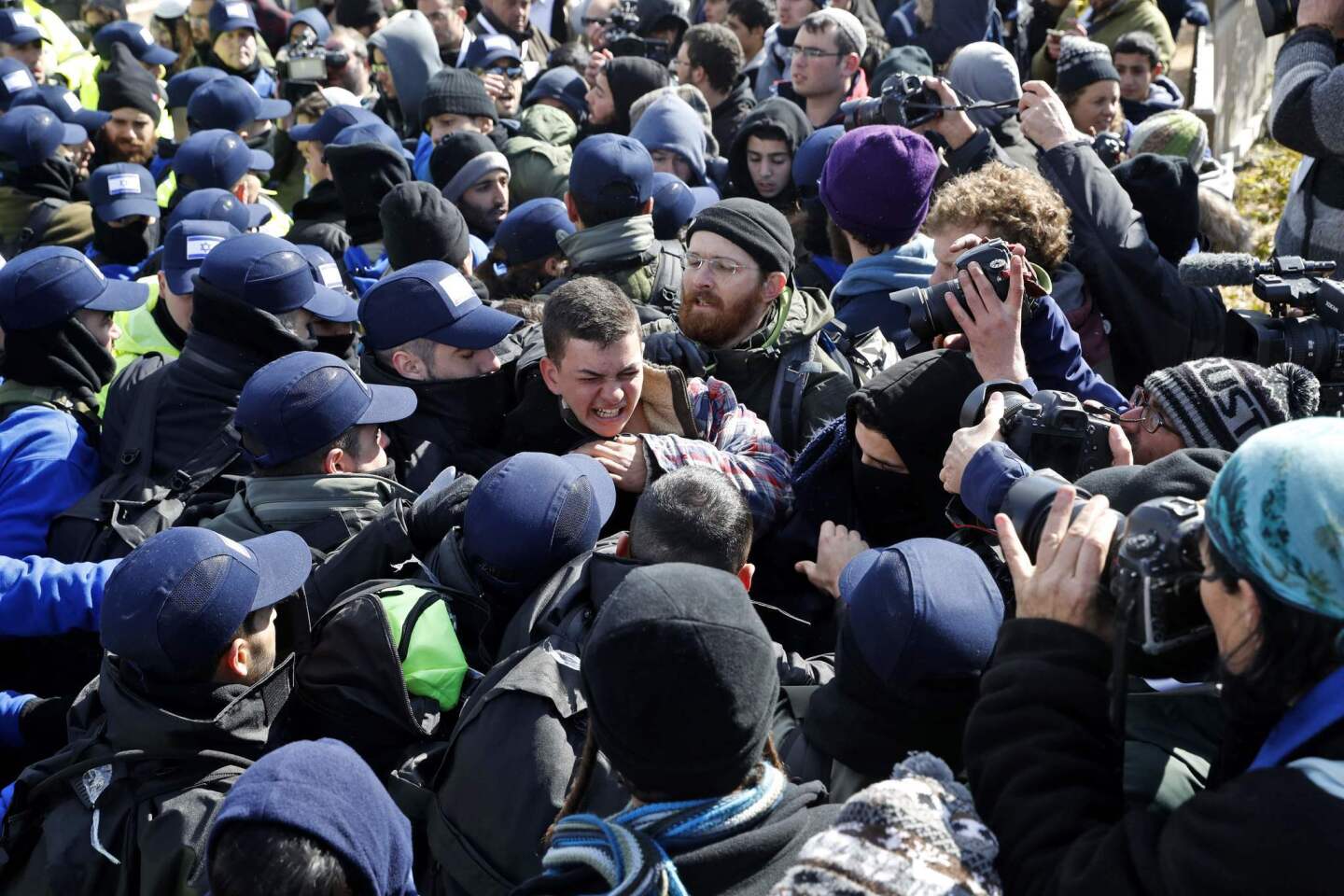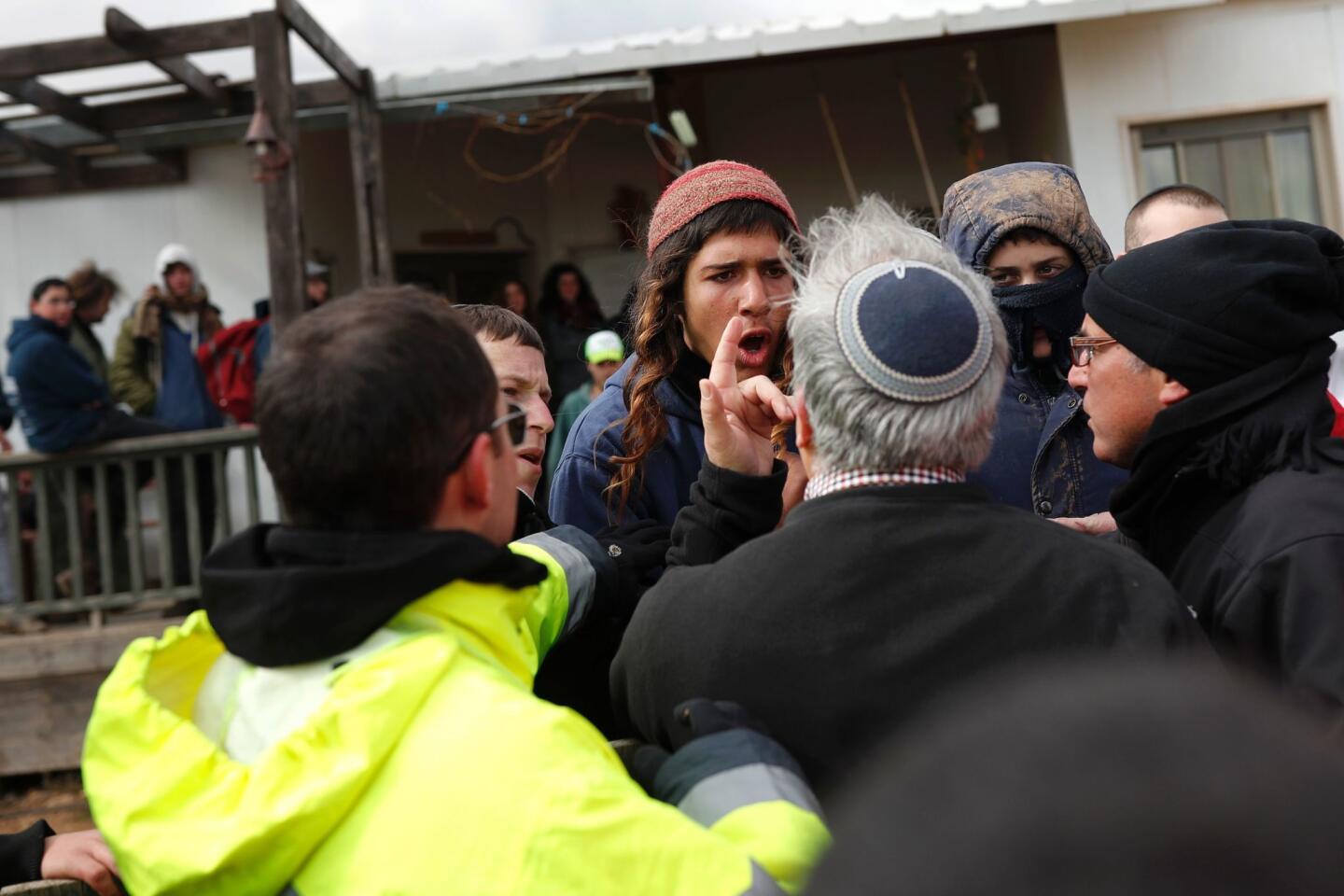Israeli forces face protesters while evacuating West Bank outpost of Jewish settlers
- Share via
Reporting from AMONA, West Bank — Israel removed hundreds of residents and activists from the unauthorized West Bank outpost of Amona on Wednesday, with police officers prying barricaded young demonstrators out of tiny mobile homes, in a rare defeat for the country’s powerful settlement movement.
As protesters shrieked “disobey the order” and “disgrace” at the security forces, four-member teams of police dragged writhing and kicking activists to nearby buses to remove them from the hilltop community of about 250 residents. Israel’s Supreme Court had ordered the area cleared of Jewish settlers because it belongs to Palestinian landowners.
The evacuation started in the early afternoon and continued into the late evening. Shortly before midnight, most of the demonstrators and residents had been removed, but police said they were trying to negotiate with a group of protesters who had barricaded themselves in the outpost synagogue.
The move to clear Amona, which police said attracted at least 750 protesters, marked the largest scale settlement evacuation since Israel pulled out of the Gaza Strip in 2005. The move stirred tension within Israeli Prime Minister Benjamin Netanyahu’s right-wing coalition government, putting it at odds with Israeli settlers in the West Bank, one of its most loyal constituencies.
“We’re not going out of here willingly,” said Oriel Pniel, a 29-year-old resident, as his family awaited police in a mobile home with metal rods and wood blocking the entryway.
“We feel they’re giving a prize to the Arab enemy,” he said. “They’re giving away part of the land of Israel, and providing a tailwind for terrorism. Instead of showing the Arabs we are getting stronger, they are doing the opposite.’’
Palestinian leaders in Ramallah, meanwhile, were unimpressed by the evacuation, with officials saying Israel’s government was using the clearing of Amona as cover to help expand settlements elsewhere.
“This is much ado about nothing. They are trying to show how difficult it is to evacuate a little outpost. They’ve made it into a big tragedy as if it’s the end of the world,’’ said Hanan Ashrawi, a senior Palestine Liberation Organization official. “What are they going to do when they have to remove 600,000 settlers? Don’t tell me the settlements are not an obstacle to peace.’’
In 2006, the Amona outpost was the site of violent clashes between pro-settler demonstrators and police in riot gear on horseback who came to enforce a court order to destroy several houses. The traumatic confrontation led to injuries on both sides and became seared into the country’s collective memory.
This time there was less resistance. The police, who brought a team of 3,000 officers for the operation, said 20 officers suffered minor injuries in Wednesday’s evacuation; at least 13 demonstrators were arrested. Some demonstrators who arrived in solidarity with the residents blocked roads with burning tires, barbed wire and boulders.
In an effort to ease resistance to the Amona evacuation, Netanyahu’s government late Tuesday gave a green light for the construction of 3,000 new homes in the West Bank.
On Sunday, Netanyahu had promised to push a controversial bill through parliament in the coming days that would retroactively legalize dozens of unauthorized hilltop outposts and thousands of homes in established settlements that were built on private property owned by Palestinians.
Palestinians and most of the international community consider some 100 hilltop outposts and more than 100 older settlements as illegal under international law. In recent months the United Nations, the U.S. and European countries warned that settlement expansion is rapidly endangering prospects for peace through a two-state solution for Israelis and Palestinians.
Ashrawi said the outpost legalization bill sponsored by the government would give Israelis in the West Bank a license for land theft. Many Israelis, including the attorney general, have expressed similar reservations.
The evacuation marked a victory for Palestinian landowners who were first barred from the hilltop in the mid-1990s and petitioned Israeli courts for years with the help of Israeli human rights groups.
“This is the first step to getting my land back. I’ve been waiting 20 years to see this moment,’’ said Ibrahim Yacoub, a 56-year-old farmer who was a party to the court case. “I am waiting for them to take the houses from my land, and for them to let me go back, and return it to the way it was 20 years ago.’’
Speaking in the Israeli parliament Wednesday, Education Minister Naftali Bennett, leader of the pro-settler Jewish Home party, vowed to build more settlements.
“This is a difficult day,’’ he said. “We’ve lost the fight for Amona, but we will win the battle for the land of Israel.”
Yakov Rudick, a 32-year-old teacher, looked on with his 5-year-old son at his side while demonstrators chained themselves together in his living room and chanted prayers in anticipation of the police.
Rudick said the evacuation of Amona was part of a larger battle within Israeli society between the political right wing and the settlers on one hand and “the extreme left’’ and a clique of high court jurists on the other hand. Despite the evacuation, Rudick said he believed the settlers had the upper hand.
“This is not only a fight over the land. It’s a fight over everything,’’ he said. “This is a war between cultures. They think we are like all the other nations, but we think that we are a special nation.”
Watching the evacuation from Ofra, the 40-year-old settlement out of which Amona grew, Pinchas Wallerstein, a former director of the local settlement council, said Jewish residents would return to the site.
“I promise you that in a few months, maximum a year, we will be back on the hilltop — and we will only get bigger,” Wallerstein said.
Mitnick is a special correspondent.
MORE WORLD NEWS
What Trump’s push to limit overseas workers means for India’s army of high-tech migrant labor
European Council president includes United States as a threat to Europe
For Syrians stuck in limbo in Lebanon, Trump’s ban will mean harder times ahead
Boiling over on the border: The reasons behind the gasoline protests in Mexico
UPDATES:
3:30 p.m.: This article has been updated with Times reporting throughout.
This article originally was published at 4:45 a.m.
More to Read
Sign up for Essential California
The most important California stories and recommendations in your inbox every morning.
You may occasionally receive promotional content from the Los Angeles Times.
